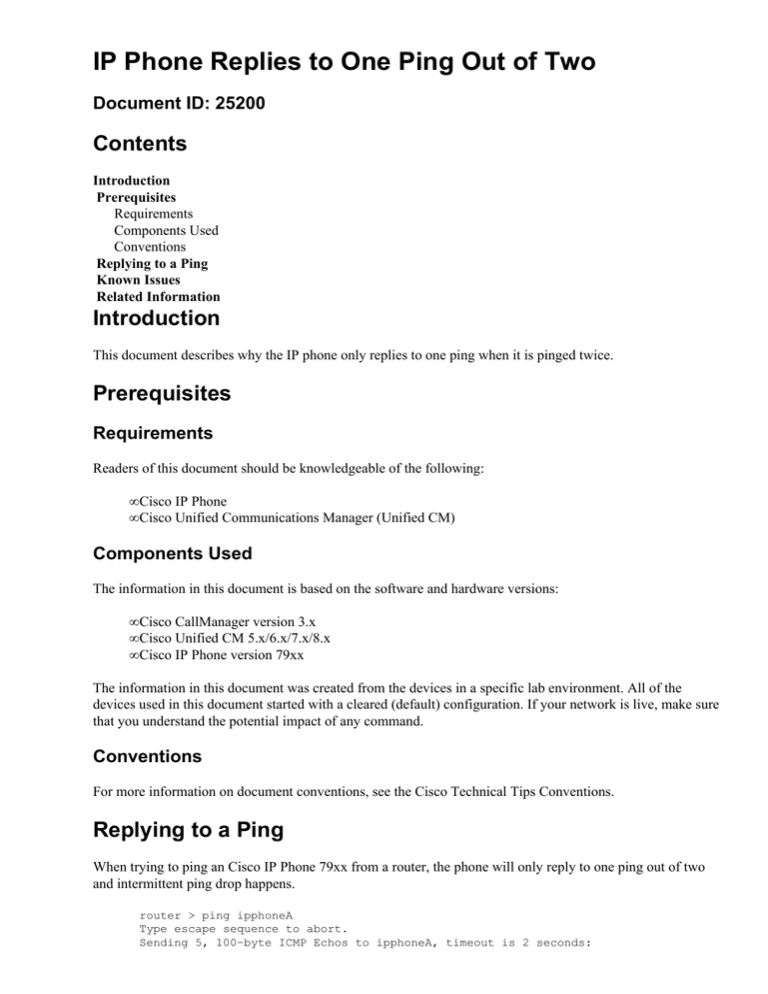
IP Phone Replies to One Ping Out of Two
Document ID: 25200
Contents
Introduction
Prerequisites
Requirements
Components Used
Conventions
Replying to a Ping
Known Issues
Related Information
Introduction
This document describes why the IP phone only replies to one ping when it is pinged twice.
Prerequisites
Requirements
Readers of this document should be knowledgeable of the following:
• Cisco IP Phone
• Cisco Unified Communications Manager (Unified CM)
Components Used
The information in this document is based on the software and hardware versions:
• Cisco CallManager version 3.x
• Cisco Unified CM 5.x/6.x/7.x/8.x
• Cisco IP Phone version 79xx
The information in this document was created from the devices in a specific lab environment. All of the
devices used in this document started with a cleared (default) configuration. If your network is live, make sure
that you understand the potential impact of any command.
Conventions
For more information on document conventions, see the Cisco Technical Tips Conventions.
Replying to a Ping
When trying to ping an Cisco IP Phone 79xx from a router, the phone will only reply to one ping out of two
and intermittent ping drop happens.
router > ping ipphoneA
Type escape sequence to abort.
Sending 5, 100−byte ICMP Echos to ipphoneA, timeout is 2 seconds:
!.!.!
Success rate is 60 percent (3/5), round−trip min/avg/max = 1/2/4
ms
This is not the case when pinging from a PC.
C:\>ping ipphoneA
Pinging ipphoneA with 32 bytes of data:
Reply from ipphoneA: bytes=32 time<10ms TTL=63
Reply from ipphoneA: bytes=32 time<10ms TTL=63
Reply from ipphoneA: bytes=32 time<10ms TTL=63
Reply from ipphoneA: bytes=32 time<10ms TTL=63
Ping statistics for ipphoneA:
Packets: Sent = 4, Received = 4, Lost = 0
(0% loss),
Approximate round trip times in milli−seconds:
Minimum = 0ms, Maximum = 0ms, Average
= 0ms
This is Working as Designed (WAD). This is because the IP phones have been designed to only reply to an
echo every 10ms, in order to withstand Denial of Service (DoS) attacks. DoS protection is provided by
limiting resources for ICMP processing and not responding to ICMP broadcast pings. A Cisco IOS gateway
sends echos more frequently, so one out of two will timeout.
This is not the case for a PC since the time between two echos is greater than 10ms.
Note: Cisco IP Phones 7902/05/12 have a different code base from the Cisco 7940/60. Consequently, there is
a delayed reply to the network ping with the 7902/05/12, but not the 7940/60.
Note: Also, for Cisco Unified CM, this behavior exists and the ICMP will be throttled in order to prevent DoS
attacks.
Known Issues
These are some of the known issues:
• CSCee46831 (registered customers only) − 7970 drops rtp connection after getting ICMP
Unreachable.
• CSCef54937 (registered customers only) − 7970: ICMP source quench behavior changes.
• CSCsb30771 (registered customers only) − Sending fragmented ICMP packet causes sending phone
to crash.
• CSCef54947 (registered customers only) − 7970: ICMP hard errors behavior changes.
• CSCsc27685 (registered customers only) − IP Reassembly broken/does not work in ip.c.
Related Information
• Cisco Security Advisory: Crafted ICMP Messages Can Cause Denial of Service
• Voice Technology Support
• Voice and Unified Communications Product Support
• Troubleshooting Cisco IP Telephony
• Technical Support & Documentation − Cisco Systems
Contacts & Feedback | Help | Site Map
© 2014 − 2015 Cisco Systems, Inc. All rights reserved. Terms & Conditions | Privacy Statement | Cookie Policy | Trademarks of
Cisco Systems, Inc.
Updated: Jun 28, 2011
Document ID: 25200


